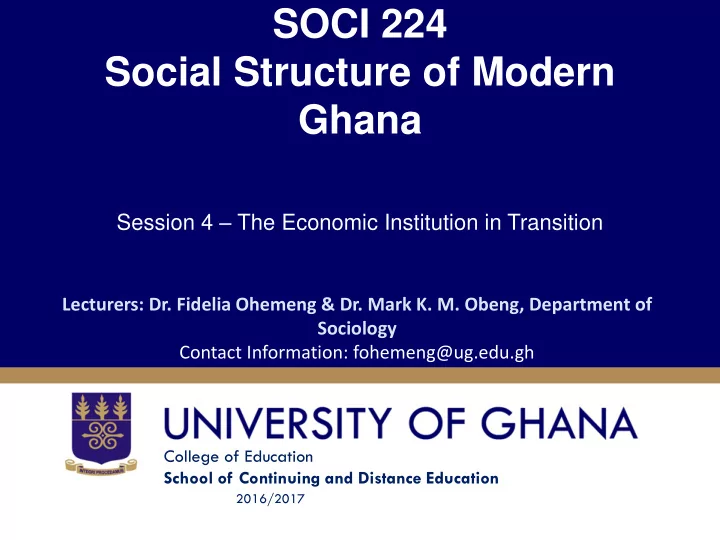

SOCI 224 Social Structure of Modern Ghana Session 4 – The Economic Institution in Transition Lecturers: Dr. Fidelia Ohemeng & Dr. Mark K. M. Obeng, Department of Sociology Contact Information: fohemeng@ug.edu.gh College of Education School of Continuing and Distance Education 2016/2017
Session Overview • This session seeks to explain to students how the traditional economy has changed, the implications of the changes and features of the modern economy, such as bureaucracy and the emergence of professionals. Slide 2
Session Outline The key topics to be covered in the session are as follows: • the sources of change and its implications for the traditional economy • the features of the modern Ghanaian economy • discuss new features of the modern economy: – Bureaucracy and its features/characteristics – Impact of bureaucracy on the society – The emergence and characteristics of professionals Slide 3
Reading List • Abotchie, C. (2014). Social Change in Ghana. Accra: Hans Publications. Chapter 5 • Nukunya, G. (2014). Tradition and Change in Ghana: an Introduction to Sociology. Accra: Ghana Universities Press. Pages 138-140 Slide 4
Topic One SOURCES OF CHANGE AND ITS IMPACT ON THE ECONOMY Slide 5
Sources of Change in the Economic Institution • The main source of change in the Economic institution: – the introduction of currency into the traditional economy – Industrialization Slide 6
The Money Economy • Barter system and its challenges led to the introduction of currency, that is the introduction of British pounds Slide 7
INDUSTRIALISATION Changes in productive technology, implying in a wider sense, the technification (automation or mechanisation) of agriculture and even of services. It means in the ultimate sense, a transition from the use of human and animal power to the use of inanimate power driven machines for the production of goods and services (i.e. commercial purposes )
THE AGE OF INDUSTRIALISATION • Took place during the 18 th C in England • Created enormous employment opportunities • Increase in production of new goods & services and development of markets across the world. • Result in urbanisation and its many consequences
The Age of Industrialization • The industrialization is characterized by: – The Rise of Heavy Industry – Railroading – Invention and Technology – The “Robber Barons” – Organized Labor
RAILROADING
THE ROBBER BARONS
Robber Barons
Industrialisation in Ghana Ghana is: • Not yet industrialised-incipient economy (hopes to) • Few industries are clustered in Tema & Accra -exceptions in the hinterlands -hinterland- Ksi, Obuasi, Bibiani, Mining & Wood Local : Agro- industries – Dependent on imported raw materials • Harbours • Technological Services: ATMs, Vending machines • Automation of Agriculture (reduction of labour needs) • Urbanisation (refer to session on Demographic Changes)
Topic Two BUREAUCRATIZATION Slide 15
BUREAUCRATISATION • This is administrative mechanism invented during the economic revolution to manage the large number of people employed in the established industries. • Max weber defines it as a system of interdependent human beings designed for the achievement of the specific objectives of organisations .
CHARACTERISTICS OF BUREAUCRACY 1. Division of labour based on functional specialisation 2. Rules governing the rights and duties of employees 3. Hierarchy of authority 4. There should be impersonality of interpersonal relationships 5. There are procedures for dealing with the work situation 6. Promotions and selections should be based on technical competence 7. Salaries are based on one’s rank in the hierarchy
Impact on the Economy • Square pegs in round holes • Favouritism/ nepotism • Redtapeism • External influence (order from above) • Set aside principles “first come first served, functional specialisation ” – Inefficiency and decline in productivity – Creates bitterness in those ignored – Breeds corruption
Topic Three PROFESSIONALISM Slide 19
Professionalism One of the cardinal features of modernization of the economy is • Training of professionals • Professional bodies or Associations to protect its sanctity • A professional is a person who has undergone a process of education considered long enough to equip him with the knowledge or competency to maintain high technical standards in his/her work.
Qualification of a professional According to W. T. Wood, a professional must satisfy five criteria 1. A body of theoretical knowledge or a system theory 2. Professional authority 3. Sanctions (protection) of the society Evidence of the sanction - resources made available for their training - give them high incentives and remunerations - given of police protection 4. Code of ethics (formal/ informal) 5. Sub -culture
EMPLOYMENT DISTRIBUTION IN GHANA • About three-quarters (75.5%) of the population 15 years and older are employed, • 1.7 percent are unemployed • 22.8 percent are economically not active. • Irrespective of sex, the population in rural areas (81.7%) is more likely to be employed than those in urban areas (69.9%). • The population in the urban area is more likely than rural dwellers to be unemployed and economically not active. Slide 22
TYPE OF WORK ENGAGED IN (15 YEARS AND ABOVE ) TYPE OF WORK TOTAL AGRICULTURE -With employees 1.7% - Without employees 24.7% - Contributing Family worker 18.9% TOTAL 45.3% Non- Agriculture (Trader, Artisans ) - With employees 4.4% - Without employees 21.6% -Contributing family worker 3.4% TOTAL 29.4% Wage employment 20.2% Casual worker 2.6% Apprenticeship 2.0% Domestics 0.2%
Assignment • Discuss the view that footballers cannot be described as professionals. Slide 24
Recommend
More recommend